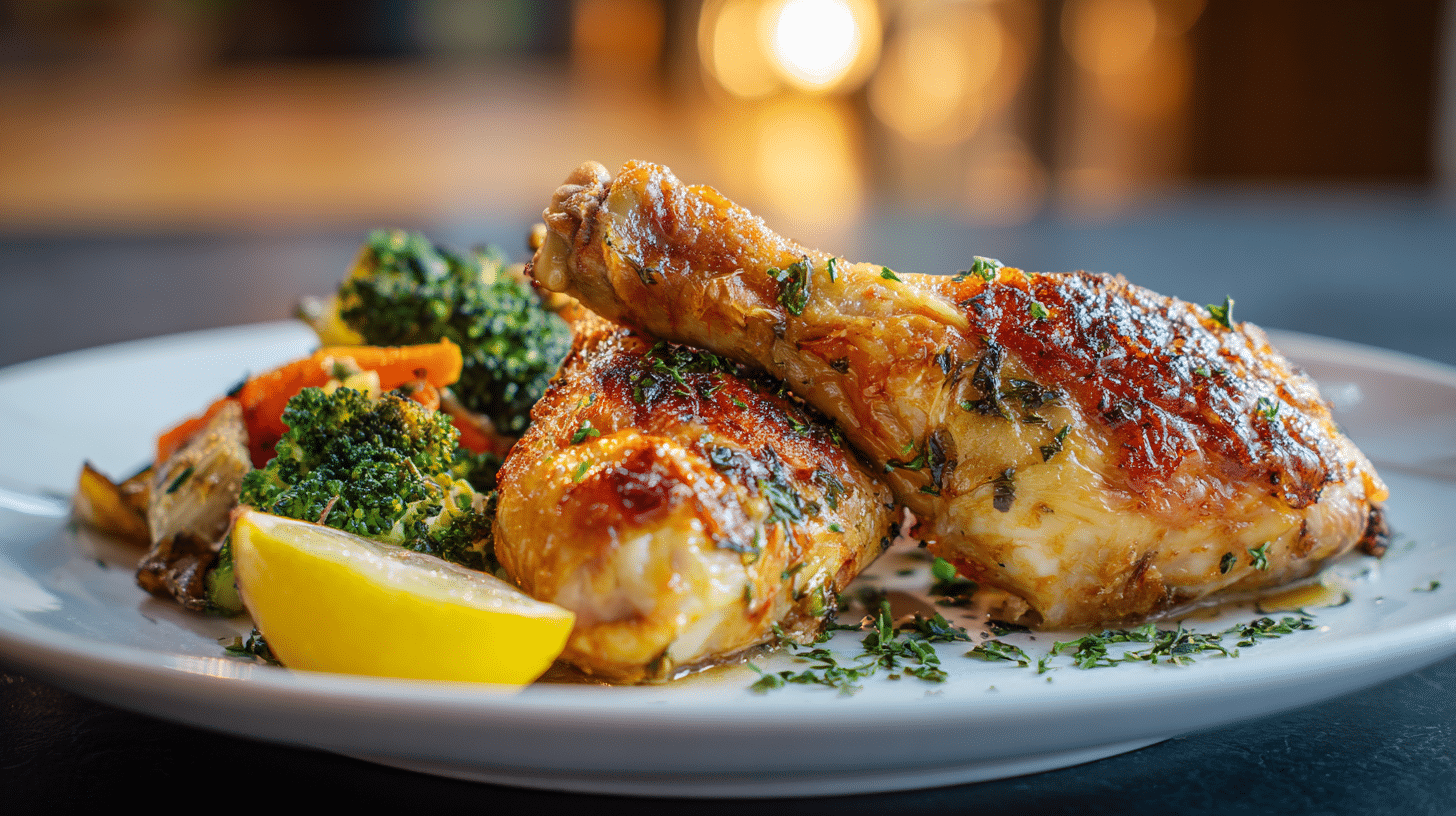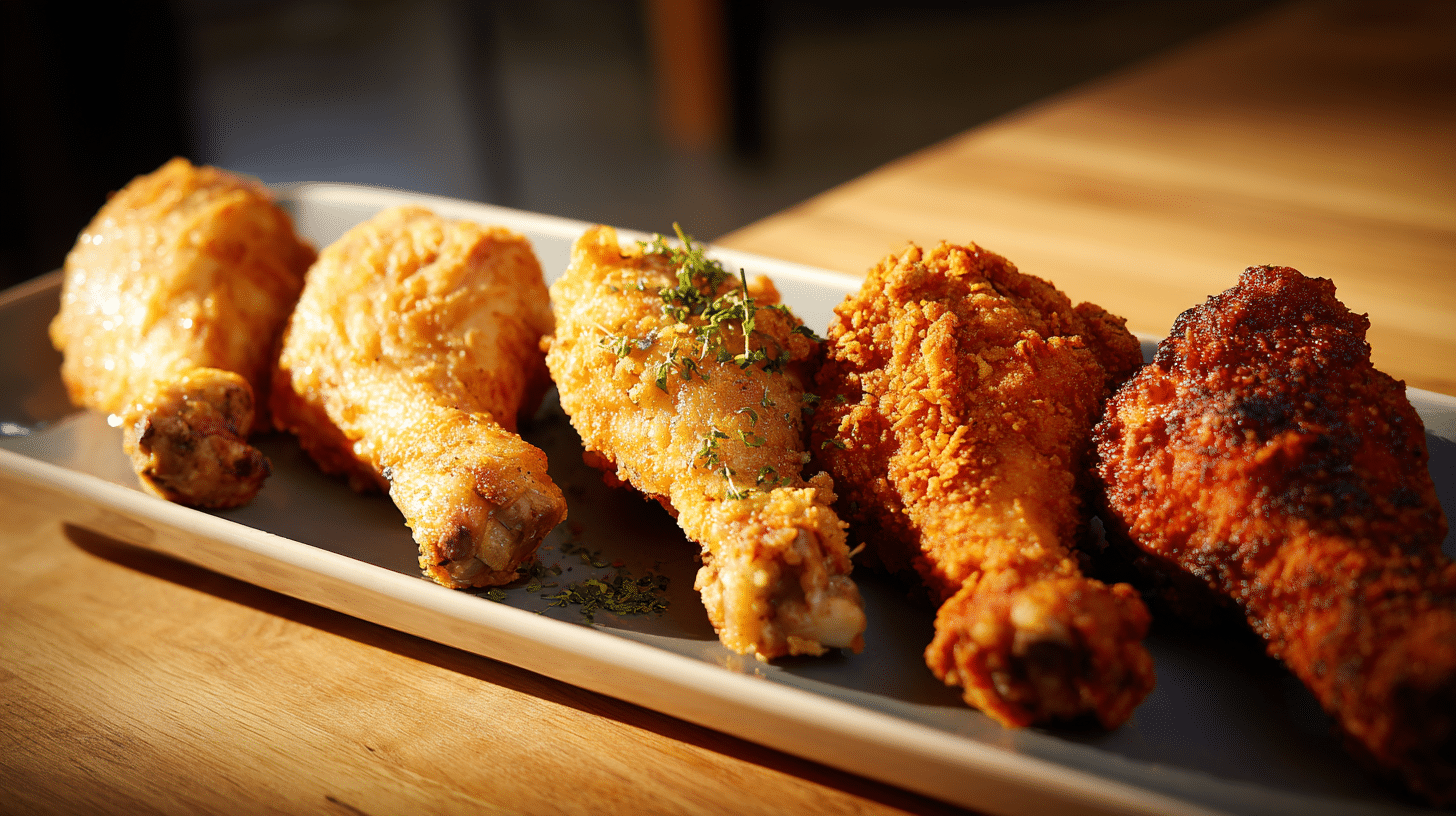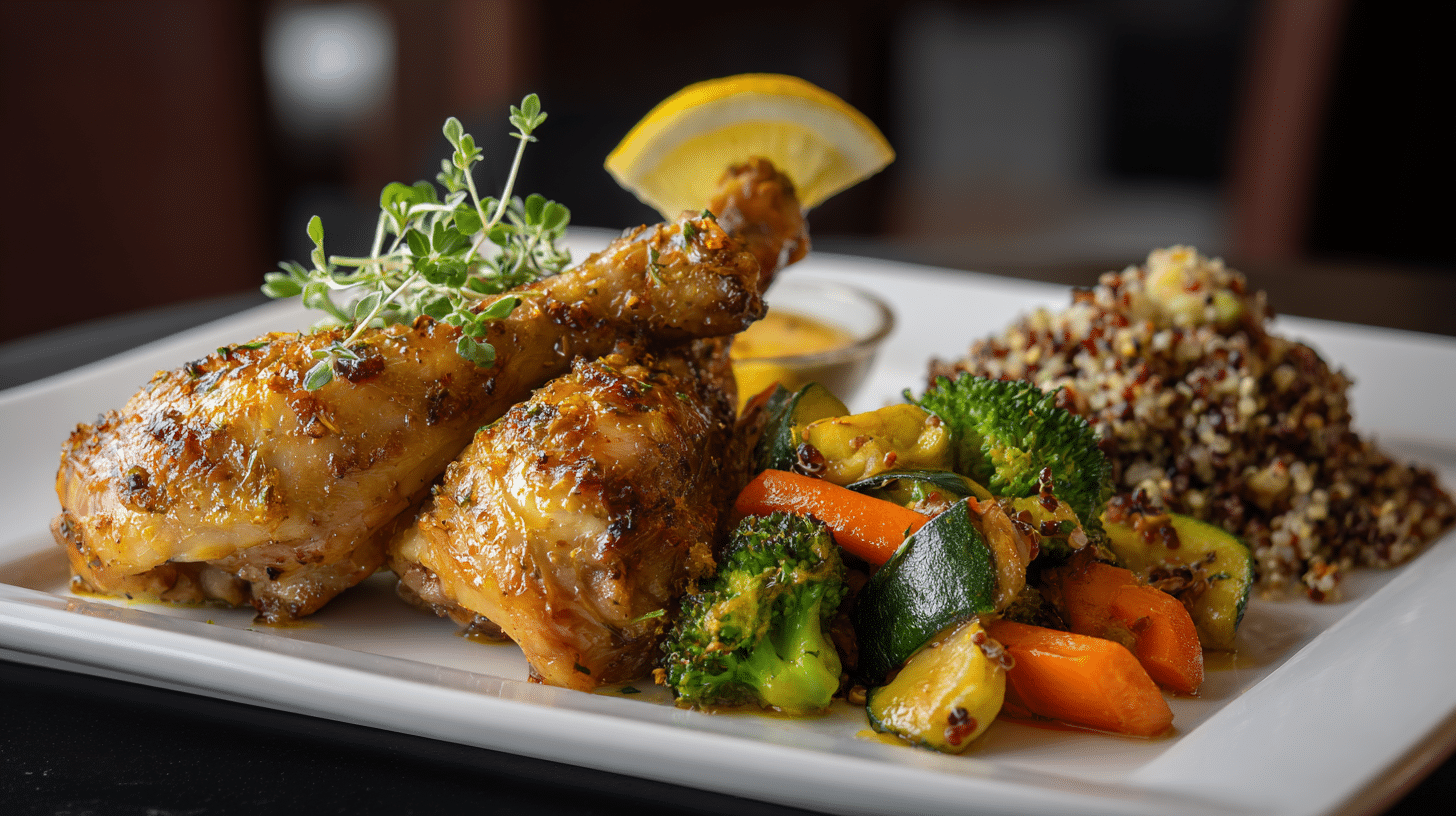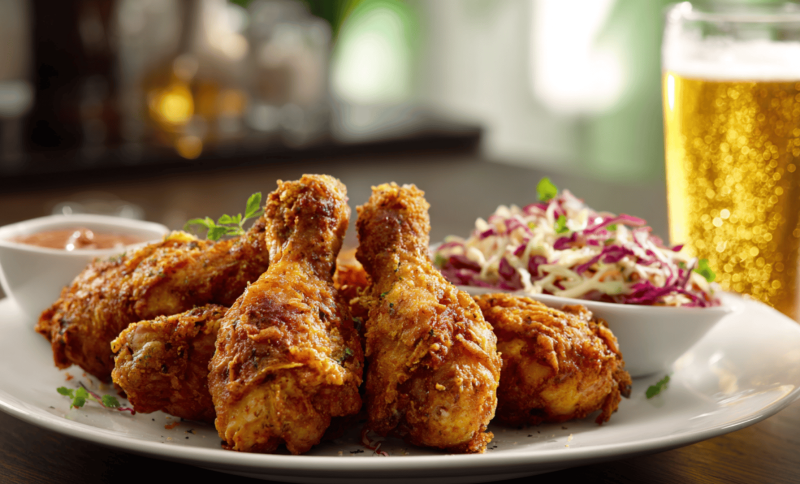Chicken drumsticks pack high-quality protein while staying budget-friendly compared to other cuts. However, calories swing dramatically based on cooking method and skin choices.
A skinless baked drumstick delivers lean protein for weight management, while fried versions can derail calorie goals.
Understanding these differences helps you maximize nutrition benefits while controlling calories.
Smart preparation choices turn drumsticks from a diet obstacle into a health ally, providing essential B vitamins and selenium alongside quality protein your body needs for energy and muscle maintenance.
The right cooking approach keeps carbs minimal while delivering maximum nutritional value.
What Counts as a Drumstick?
When we talk about drumstick calories, we’re referring to the edible meat part. The bone doesn’t count toward the calories, but it does add weight.
This is why you might see different calorie counts depending on whether someone is measuring the whole drumstick (with bone) or just the meat you actually eat.
Think of it like this: if you buy a drumstick that weighs 4 ounces, about half of that weight is bone. The meat you eat is closer to 2 ounces.
How Many Calories Are in a Chicken Drumstick?

Here are the basic numbers you need to know for average raw chicken drumsticks:
- Raw drumstick with skin: About 75-85 calories and 12-14g protein per 100g raw weight
- Raw drumstick without skin: Around 65-75 calories and 13-15g protein per 100g raw weight
- Medium raw drumstick (80-100g): Contains roughly 60-85 calories before cooking
Cooking method significantly impacts the final calorie content. Baking maintains similar calories, while frying can nearly double them due to oil absorption and breading.
Why Do Calorie Numbers Vary?
Several factors affect how many calories are in your drumstick:
- Size matters: A bigger drumstick has more meat and more calories. It’s like comparing a small apple to a large one.
- Skin on or off: The skin contains fat, which means extra calories. Keeping the skin can add 20-30 more calories per drumstick.
- Cooking method: How you cook the drumstick makes a huge difference. Frying adds oil, while baking doesn’t need extra fat.
- Breading and sauces: These extras can double the calories. A plain baked drumstick is very different from one covered in batter and sauce.
How Much Protein in a Chicken Drumstick: Complete Nutrition Facts
Chicken drumsticks aren’t just about calories. They’re packed with important nutrients your body needs.
1. Protein Content
This is where drumsticks really shine. One drumstick without skin gives you about 24-26 grams of protein per 100 grams.
That’s almost half of what many adults need in a whole day.
2. Fats and Calories
The amount of fat depends on the skin and the cooking method. Skinless drumsticks are much leaner, while keeping the skin or frying adds more fat.
3. Carbs and Other Nutrients
Plain chicken has almost zero carbs. The only time you’ll find carbs in drumsticks is when they’re breaded or coated.
Drumsticks also provide B vitamins (especially niacin), selenium, and phosphorus. These help your body make energy and keep your bones strong.
Calorie Breakdown by Cooking Method

Your cooking method determines whether drumsticks support or sabotage your health goals. Here’s how each preparation affects calories and nutrition.
1. Baked with Skin
When you bake drumsticks with the skin on, you get crispy skin and juicy meat. One drumstick typically has around 160-180 calories.
The skin adds fat, but it also adds flavor. If you’re not watching calories too closely, this can be a tasty option.
2. Baked without Skin
This is the leanest way to prepare drumsticks. Without the skin, you’re looking at about 149-171 calories per 100 grams of cooked meat.
That translates to roughly 70-85 calories for one medium drumstick. You’ll get lots of protein with less fat.
3. Air-Fried
Air frying has become super popular because it gives you crispy results with less oil than deep frying. An air-fried drumstick usually falls somewhere between baked and fried in terms of calories.
You might see around 120-150 calories per medium drumstick, depending on any oil or seasonings used.
4. Deep-Fried
This is where calories can really add up. A deep-fried drumstick with breading can pack around 200 calories or more.
The oil absorption and breading both contribute extra calories. If you’re eating fried chicken occasionally, it’s fine. But if you’re watching your weight, this might not be your everyday choice.
How Drumsticks Compare to Other Chicken Parts
Let’s see how drumsticks stack up against other chicken cuts (all numbers are per 100 grams of cooked meat):
| Chicken Cut | Calories | Protein | Fat |
|---|---|---|---|
| Drumstick (skin-off) | 149-171 | 24-26g | 4-7g |
| Chicken Breast (skin-off) | 165 | 31g | 3.6g |
| Chicken Thigh (skin-off) | 209 | 26g | 10.9g |
| Chicken Wing (skin-on) | 203 | 30g | 8.1g |
As you can see, drumsticks are right in the middle. They’re more affordable than breasts, more kid-friendly than thighs, and more filling than wings.
Smart Ways to Include Drumsticks in Your Healthy Diet

Drumsticks adapt to virtually any eating plan with the right preparation approach. Here are strategic ways to incorporate them based on your specific health goals.
- Weight Loss Strategy: Choose skinless, baked, or air-fried drumsticks paired with vegetables or large salads for filling meals under 250 calories.
- Muscle Building Focus: Keep the skin on for extra calories and healthy fats, then add carb sources like rice or potatoes for post-workout recovery fuel.
- Portion Control Guide: Stick to 2 medium drumsticks (150-200g edible meat) as a standard protein serving for most adults.
- Smart Cooking Method: Remove skin after cooking to enjoy flavor during preparation while saving calories, or bake on a wire rack so fat drips away.
- Seasoning Strategy: Use dry herbs, spices, and rubs instead of sauces to add maximum flavor without extra calories or sodium.
- Healthy Side Pairings: Choose roasted vegetables, brown rice, or quinoa over fries or creamy sides to create balanced, nutritious meals.
The Bottom Line
Chicken drumsticks can fit into almost any eating plan. Whether you’re trying to lose weight, build muscle, or just eat healthier, drumsticks offer good protein at a reasonable calorie cost.
The key is choosing cooking methods that match your goals and paying attention to what else you add to the plate.
Focus on cooking methods you enjoy, pair your drumsticks with plenty of vegetables, and don’t stress too much about the exact numbers.
Good nutrition is about the big picture, not perfect calorie counting.
Ready to put this knowledge to use? Try baking some drumsticks with your favorite seasonings this week. Your taste buds and your health goals will both be happy.
Frequently Asked Questions
How Many Calories Are in 2 Drumsticks?
This depends on size and cooking method, but typically 140-400 calories total. Skinless baked drumsticks are on the lower end, while fried drumsticks with breading are on the higher end.
Are Drumsticks Good for High-Protein Diets?
Yes! Drumsticks provide excellent protein, especially when the skin is removed.
Is Fried Chicken Ever Okay?
If you enjoy fried drumsticks occasionally as part of an otherwise healthy diet, there’s no problem with that. Just be mindful of portions and what you eat alongside them.













